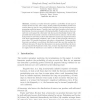Free Online Productivity Tools
i2Speak
i2Symbol
i2OCR
iTex2Img
iWeb2Print
iWeb2Shot
i2Type
iPdf2Split
iPdf2Merge
i2Bopomofo
i2Arabic
i2Style
i2Image
i2PDF
iLatex2Rtf
Sci2ools
115
click to vote
COCOON
2007
Springer
2007
Springer
Efficient Testing of Forecasts
Each day a weather forecaster predicts a probability of each type of weather for the next day. After n days, all the predicted probabilities and the real weather data are sent to a test which decides whether to accept the forecaster as possessing predicting power. Consider tests such that forecasters who know the distribution of nature are passed with high probability. Sandroni shows that any such test can be passed by a forecaster who has no prior knowledge of nature [13], provided that the duration n is known to the forecaster in advance. On the other hand, Fortnow and Vohra [7] show that Sandroni's result may require forecasters with high computational complexity and is thus of little practical relevance in some cases. We consider forecasters who select a deterministic Turing-machine forecaster according to an arbitrary distribution and then use that machine for all future forecasts. We show that forecasters even more powerful than the above ones are required for Sandroni'...
Related Content
| Added | 14 Aug 2010 |
| Updated | 14 Aug 2010 |
| Type | Conference |
| Year | 2007 |
| Where | COCOON |
| Authors | Ching-Lueh Chang, Yuh-Dauh Lyuu |
Comments (0)

